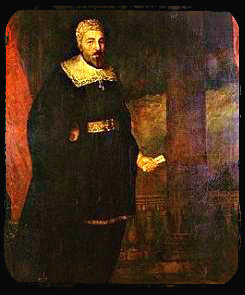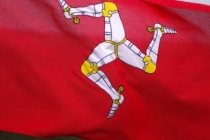Illiam Dhône Commemoration 2015 - Mannin (Isle of Man)

This years Illiam Dhône commemoration took place on 2nd January 2015. It was close to the location of Hango Hill that Manx National hero Illiam Dhône was shot on 2nd January 1663. Hango Hill is also possibly a prehistoric burial site with an artificial mound. Its name comes from the Norse 'Hanga-Haugr', meaning Gallows Hill. Illiam Dhône (14 April 1608 - 02 January 1663) was a Manx nationalist and politician, who was executed by firing squad at Hango Hill in the Isle of Man on 2nd January 1663 for his part in the Manx Rising of 1651. The name Illiam Dhône means "Brown William" in English, a name that was given to him because of his hair colour. His name in English was William Christian. Illiam Dhône was appointed Receiver General of the Isle of Man in 1648.
This years event was held on a very bright and cold winters day. The days proceedings were introduced by Bernard Moffatt, Director of Information for The Celtic League. The oration in Manx Gaelic was given by Cesar Joughin. Cesar is the son of well known Manx musicians Greg and Hilary Joughin. The oration in English was given by Alastair Kneale, President of Yn Cheshaght Vanninagh Lunnin (London Manx Society) and Transceltic.com contributor. Mark Kermode of Mec Vannin (the Manx nationalist party) talked of the need for the Manx government to change course from the programme of austerity which they have followed for a number of years now and to act in the best interests of ordinary Manx people.
Below is the speech given by Alastair Kneale in which he quoted from an interview with historian John Callow which he gave to the inter-Celtic website Transceltic.com on the important legacy of Illiam Dhône to the Manx Nation. Alastair also highlighted the importance of cross Celtic solidarity. He concluded with a call for continued support for the Celtic Nation of Brittany and the fight for the Reunification of Brittany.
Alastair Kneale’s Speech for the Illiam Dhône Commemoration 2015
Illiam Dhône was clearly moved to act in the best interests of the Manx people and his Celtic homeland. As historian John Callow points out – ‘he knew full well what could happen to a native Gaelic society when it was visited by English invasion. Tales of (and refugees from) Ireland at the time of both the massacres of 1640 and the Cromwellian conquest of 1649 would have been the source of frightening rumours and first-hand accounts of the cultural and physical devastation wrought by the total collapse of Charles I’s government.’ The alarming appearance of a Commonwealth fleet off the coast, in 1651, effectively decided matters for him.
Illiam Dhône remains important today because he remained true to, and in large measure, attained his goals on behalf of the native Manx. Not many of his successors can say the same. His actions preserved the House of Keys , the traditional government and customs of Mann, and spared the island from the ravages of war and foreign invasion. In addition, he was prepared to take the consequences of his actions and to die bravely for his beliefs. He is as much a hero to the Manx as Owain Glyndwr is for the Welsh; William Wallace for the Scots; and Wolfe Tone for the Irish. So it is with great pride to have the honour of speaking at this commemoration today.
Celtic nations have a history of fighting against colonialism and oppression. When we look at the very real and determined attempts to stamp out and destroy the indigenous Celtic cultures it is a testament to all of those over the centuries that have fought against all odds to ensure our survival as the Celtic peoples of Europe. We should never forget the great and well known heroes that have been figure heads of these struggles, including our own Illiam Dhône. But we also need to recognise those who suffered under terrible oppression and whose cries of anguish still echo through the hills and valleys of our Celtic homelands. Such as those in the Scottish Highlands when ethnic cleansing took place at the hands of the English victors after the Battle of Culloden . When houses were burned, the speaking of Gaelic and the wearing of tartan was banned. The centuries of colonialism in Ireland. When over many hundreds of years, the native people were thrown off their lands. Suffering murderous oppression resulting in poverty, misery, starvation and mass migration.
However, as well as unknown victims there are also many many unsung heroes. Who banded together to protect their rights, fought and faced tremendous repercussions in keeping their national identity alive. So when here at this commemoration let us remember all of those who have worked for National liberation. It has never been easy. The Celtic people have faced tremendous and overwhelming odds. Next year is also the one hundredth anniversary of the Irish Easter Rising. Those brave people in 1916 began a series of events that saw Ireland’s defeat of Britain at a time when that Empire was at its height. We know that nothing comes without a struggle. It is part of the Celtic peoples history to have to fight for their very survival. But what history has shown is that even when others might think we are defeated, our culture destroyed and our very existence extinguished. we refuse to take it and come out fighting.
Let us be honest, within the Celtic nations we also have our traitors and sycophants who will bow their heads to foreign rulers. They will always be there in one form of another. We saw them in the Scottish referendum with so called Scottish Labour politicians aligning with their Conservative and Liberal allies to oppose Scottish independence. In doing so making false vows to the Scottish people as they sided with the British establishment. Of course they also had behind them the weight of the media, including the British Broadcasting Corporation. That also begs the question about why in the Isle of Man people pay a levy to this broadcaster. Manx people should not pay a Licence fee to the BBC and this needs to be ended.
Amongst all of this struggle we should never forget the positive things that are going on now within the Celtic nations. We have seen tremendous campaigns to protect and promote the Celtic languages. remember there are only six Celtic languages spoken in the world today: Breton, Cornish, Irish, Scottish Gaelic, Manx and Welsh. The growth and support for the Manx within our own Mannin has been fantastic. We have also seen the tremendous efforts of our Scottish cousins in campaigning for independence. At the first attempt they received 45% in favour of breaking from the Union. That campaign for Scottish independence will continue. Those that think they managed to hold the union together by mass propaganda, falsification of the facts and downright lies know this. They will not get away with it again. You only have to look at present opinion polls and the massive increase in membership and support for The Scottish National Party since the referendum.
There are many fights ahead of course both on Mannin and in other Celtic nations. However, it is important that we as Celtic nations support each other at these times. Battles lie ahead on such issues as the ongoing campaign for a Cornish Assembly and defending Irish language rights. The work of The Celtic League on many issues is tremendous. So I am going to end on reiterating support for another of our Celtic nations-Brittany. We have seen dreadful attempts over many years by the French establishment to undermine and destroy the Breton language and culture. For decades now the people of Brittany have sought to regain the territory of Nantes and the Loire Atlantique that was lost to them at the behest of the French Vichy government in the early 1940’s. There has been great campaign in Brittany for the reunification of Brittany. An opportunity to redress this act of vandalism upon Brittany was presented to the French government during the recent legislation on territorial reform. They failed and the opportunity has been lost. However, this will not be the end of the matter. That campaign by the Breton people will continue. So to our cousins in Brittany a message of support from Mannin - Bretagne Réunie.
Watch a recording of the speech: www.manx.net/tv/mt-tv/
Further reading
- Manx
- English
- Log in to post comments





